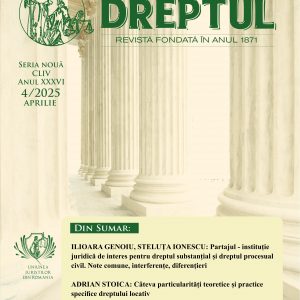-
 This study is intended to approach the legislative models of the definition of the offence in the criminal legislations of the Romanian area (Romania and Republic of Moldova). Three concepts were identified through the prism of which in the reference legislations was defined the notion of offence: substantial or material concept, formal concept and substantial-formal concept. These models were determined by the social interests that formed the object of the legal-criminal protection in the corresponding period of the development of society.
This study is intended to approach the legislative models of the definition of the offence in the criminal legislations of the Romanian area (Romania and Republic of Moldova). Three concepts were identified through the prism of which in the reference legislations was defined the notion of offence: substantial or material concept, formal concept and substantial-formal concept. These models were determined by the social interests that formed the object of the legal-criminal protection in the corresponding period of the development of society. -

-
 Introducere. Actuala ordine mondială cunoaște o profundă transformare, ca urmare a multiplelor raporturi economice, sociale, politice, care influențează umanitatea, prin procesul globalizării. Revoluția ideilor, care depășește spațiul exprimării și dezbaterilor, își găsește o formă de manifestare printr-o diversitate de acțiuni, așa încât putem vorbi de o cultură mondială a informației care capătă consistență în orice domeniu, de la cel care vizează natura planetei noastre, până la cele care se referă la viața cotidiană. Așadar, în contextul exploziei informaționale, în care tehnologia dobândește dimensiune inteligentă, invadând în acest fel însăși existența noastră, aceasta rămâne totuși, la momentul actual, dependentă relativ de umanitate.
Introducere. Actuala ordine mondială cunoaște o profundă transformare, ca urmare a multiplelor raporturi economice, sociale, politice, care influențează umanitatea, prin procesul globalizării. Revoluția ideilor, care depășește spațiul exprimării și dezbaterilor, își găsește o formă de manifestare printr-o diversitate de acțiuni, așa încât putem vorbi de o cultură mondială a informației care capătă consistență în orice domeniu, de la cel care vizează natura planetei noastre, până la cele care se referă la viața cotidiană. Așadar, în contextul exploziei informaționale, în care tehnologia dobândește dimensiune inteligentă, invadând în acest fel însăși existența noastră, aceasta rămâne totuși, la momentul actual, dependentă relativ de umanitate. -
 În contextul actual, în care justiția română își face temele sub monitorizarea „Mecanismului de Control și Verificare” (MCV), în care atacurile la adresa independenței justiției au crescut semnificativ, în care reținerea și arestarea echivalează, în mentalul colectiv, cu dovezi indubitabile de vinovăție, rolul judecătorului în realizarea actului de justiție pare să fie unul secundar, de vreme ce nimeni nu mai pare interesat de hotărârea judecătorească definitivă pronunțată în dosarele penale.
În contextul actual, în care justiția română își face temele sub monitorizarea „Mecanismului de Control și Verificare” (MCV), în care atacurile la adresa independenței justiției au crescut semnificativ, în care reținerea și arestarea echivalează, în mentalul colectiv, cu dovezi indubitabile de vinovăție, rolul judecătorului în realizarea actului de justiție pare să fie unul secundar, de vreme ce nimeni nu mai pare interesat de hotărârea judecătorească definitivă pronunțată în dosarele penale. -
 In the above-mentioned study, the author, bringing to discussion a number of provisions included in the recently adopted Law no. 202/2010 on certain measures to accelerate the settlement of trials (usually called, the Law of the “small reform” of civil procedure) detects a number of inconsistencies between some provisions of this law and the future new Civil Procedure Code (Law no. 134/2010), adopted by the Parliament, published in the “Official Journal of Romania” on 15 July 2010, but, unfortunately, not yet in force), inconsistencies that, inexorably, will generate difficulties and complications upon the entry into force of the new Civil Procedure Code.
In the above-mentioned study, the author, bringing to discussion a number of provisions included in the recently adopted Law no. 202/2010 on certain measures to accelerate the settlement of trials (usually called, the Law of the “small reform” of civil procedure) detects a number of inconsistencies between some provisions of this law and the future new Civil Procedure Code (Law no. 134/2010), adopted by the Parliament, published in the “Official Journal of Romania” on 15 July 2010, but, unfortunately, not yet in force), inconsistencies that, inexorably, will generate difficulties and complications upon the entry into force of the new Civil Procedure Code. -

-

-
 In this article, whilst critically analyzing the relapse doctrine and jurisprudence, the authors argue that the provisions of Article 38 paragraph (2) of the Criminal Code – which stipulates for that convictions for which rehabilitation occurs or for which the rehabilitation period was completed do not entail the relapse status - do not imply that the relapse status is determined by court rehabilitation decision, but just by meeting the rehabilitation deadline, without inquiring whether the other judicial rehabilitation requirements are also fulfilled.
In this article, whilst critically analyzing the relapse doctrine and jurisprudence, the authors argue that the provisions of Article 38 paragraph (2) of the Criminal Code – which stipulates for that convictions for which rehabilitation occurs or for which the rehabilitation period was completed do not entail the relapse status - do not imply that the relapse status is determined by court rehabilitation decision, but just by meeting the rehabilitation deadline, without inquiring whether the other judicial rehabilitation requirements are also fulfilled. -
 The study analyzes the essential regulations in the matter of labour relations occurred after the historic act of the Great Union of 1918. There are presented the correlations between the constitutional regulations and those included in the laws in the matter, respectively in the Labour Codes. It is reached the conclusion that the labour law is different from one social order to another, but, at the same time, there are also constant elements of the labour law. In the last century the labour law doctrine, a branch of law which emerged after 1950 in the years of socialism, had an evolution, in the mirror, but the market economy continues to exist as well. The founders of the science of the labour law were Șerban Beligrădeanu, Virgil I. Cîmpianu, Sanda Ghimpu and Leonid Miller.
The study analyzes the essential regulations in the matter of labour relations occurred after the historic act of the Great Union of 1918. There are presented the correlations between the constitutional regulations and those included in the laws in the matter, respectively in the Labour Codes. It is reached the conclusion that the labour law is different from one social order to another, but, at the same time, there are also constant elements of the labour law. In the last century the labour law doctrine, a branch of law which emerged after 1950 in the years of socialism, had an evolution, in the mirror, but the market economy continues to exist as well. The founders of the science of the labour law were Șerban Beligrădeanu, Virgil I. Cîmpianu, Sanda Ghimpu and Leonid Miller. -

-
 This article proposes a solution to identify the initial moment of the period of prescription of the criminal liability in case of the offence of deception, in the particular situation where the material element is separated in time from the immediate follow-up. In order to resolve this matter of law it is necessary to establish the legal nature of the offence of deception, from the point of view of the offence unity. If a progressive offence is in question, the form of legal unity being part of the category of offences with duration of consummation in time, the period of prescription of the criminal liability begins to run from the date of committing the action or inaction.
This article proposes a solution to identify the initial moment of the period of prescription of the criminal liability in case of the offence of deception, in the particular situation where the material element is separated in time from the immediate follow-up. In order to resolve this matter of law it is necessary to establish the legal nature of the offence of deception, from the point of view of the offence unity. If a progressive offence is in question, the form of legal unity being part of the category of offences with duration of consummation in time, the period of prescription of the criminal liability begins to run from the date of committing the action or inaction. -

